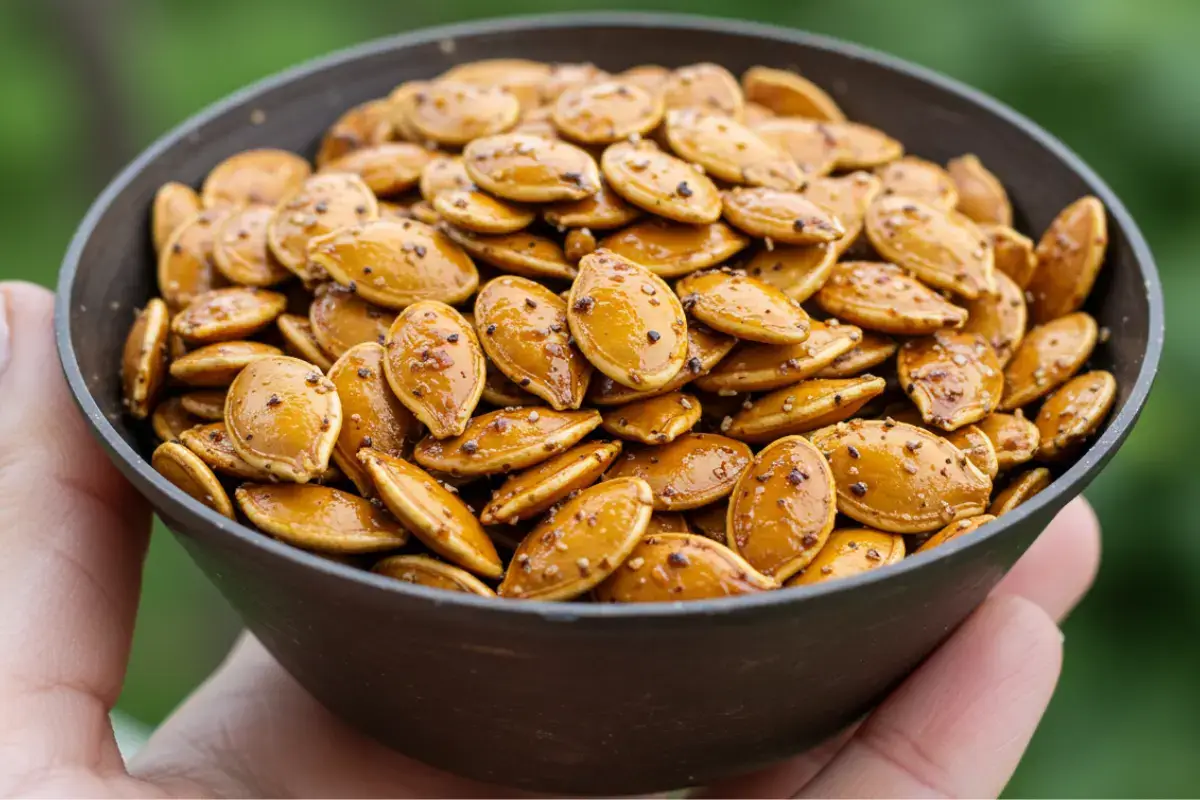Table of Contents
Overview of Roasted Kabocha Squash seeds
Have you ever crunched on a handful of roasted kabocha squash seeds and wondered about their origin and benefits? Whether you’re a seasoned foodie or just exploring healthier snack options, roasted kabocha squash seeds offer a delightful combination of flavor and nutrition. In this article, we’ll dive deep into everything you need to know about these tasty seeds, from their health benefits to creative roasting techniques.
Kabocha squash, often referred to as Japanese pumpkin, is a vibrant orange vegetable with a rich, sweet flavor and a velvety texture. Originating from Japan, kabocha squash has gained popularity worldwide for its versatility in both savory and sweet dishes. Unlike its more familiar cousin, the traditional pumpkin, kabocha boasts a firmer texture and a more intense sweetness, making it a favorite in soups, desserts, and, of course, roasted Kabocha Squash seeds.
Health Benefits of Roasted Kabocha Squash seeds
Roasted Kabocha Squash seeds aren’t just delicious—they are packed with nutrients that contribute to overall health. A single serving of kabocha squash provides:
Incorporating roasted kabocha squash seeds into your diet enhances these benefits, offering a crunchy, nutrient-dense snack that’s both satisfying and heart-healthy.
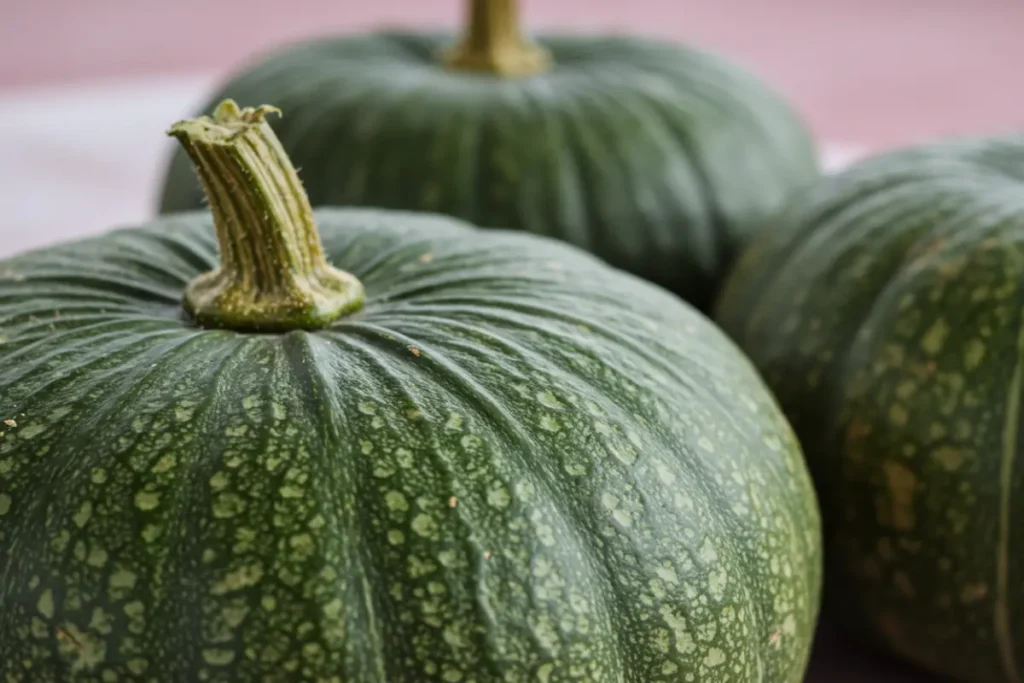
Here’s a closer look at what makes them so beneficial:
- Vitamins: High in Vitamin A and C, supporting eye health and immune function.
- Minerals: Rich in potassium, magnesium, and iron, essential for muscle function and oxygen transport.
- High in Fiber, Protein, and Healthy Fats: These seeds provide a balanced mix of macronutrients, making them a satisfying snack that keeps hunger at bay.
| Nutrient | Amount per 1 oz (28g) |
|---|---|
| Calories | 150 |
| Protein | 7g |
| Fiber | 2g |
| Healthy Fats | 13g |
| Magnesium | 40% Daily Value (DV) |
| Zinc | 20% DV |
| Iron | 15% DV |
| Vitamin E | 10% DV |
Health Advantages:
- Supports Heart Health: The healthy fats in roasted kabocha squash seeds help lower bad cholesterol levels, reducing the risk of heart disease.
- Boosts Immune System: With high levels of zinc and vitamin E, these seeds strengthen your immune defenses against common illnesses.
- Promotes Digestive Health: The fiber content aids in regular bowel movements and promotes a healthy digestive system.
Comparison with Other Roasted Seeds
While pumpkin and sunflower seeds are popular roasted snacks, roasted kabocha squash seeds stand out for their unique flavor and higher nutrient density. Compared to pumpkin seeds, kabocha seeds offer a slightly sweeter taste and a more substantial crunch. Sunflower seeds, on the other hand, tend to have a milder flavor, making kabocha seeds a more flavorful alternative for those seeking a bit more zest in their snacks.
Selecting the Perfect Winter Squash for Seed Roasting
Winter squashes come in various shapes, sizes, and flavors. The most popular types for roasting seeds include:
- Kabocha Squash: Known for its sweet flavor and creamy texture.
- Pumpkin: The classic choice, widely available and versatile.
- Butternut Squash: Sweet and nutty, perfect for both seeds and flesh.
- Acorn Squash: Mild flavor with tender seeds, ideal for roasting.
Why Choose Roasted Kabocha Squash Seeds?
- Superior Flavor and Texture: The seeds have a robust, slightly sweet flavor that stands out after roasting.
- Ease of Seed Extraction and Cleaning: Kabocha squash seeds are easier to extract and clean, making the preparation process smoother.
Roasted kabocha squash seeds are more than just a tasty treat. They are a versatile addition to various dishes, adding texture and flavor. Whether you’re sprinkling them over a fresh salad, mixing them into homemade granola, or enjoying them straight out of the bowl, these seeds are a nutritious alternative to traditional snacks like chips or nuts.
Ingredients for Roasted Kabocha Squash Seeds
Experimenting with different spices can elevate your roasted kabocha squash seeds. Try balancing sweet and savory flavors to create a unique taste profile that suits your palate.
Essential Ingredients
Olive Oil: Acts as a binder for the seasonings and helps in achieving a crispy texture.
Salt: Enhances the natural flavor of the seeds. Opt for sea salt or kosher salt for better taste.
Optional Seasonings and Flavorings
- Savory Options: Garlic powder, paprika, cayenne pepper, smoked paprika, cumin, chili powder.
- Herbs: Rosemary, thyme.
Basic Seasoning Options
- Salt and Pepper: The simplest way to enhance flavor.
- Garlic Powder: Adds a savory depth.
- Paprika: Introduces a smoky note.
Creative and Unique Flavor Combinations
Sweet Options
- Cinnamon and Sugar: Perfect for a sweet treat.
- Maple Syrup Glaze: Adds a rich, caramelized flavor.
Savory Options
- Smoked Paprika and Cumin: Creates a smoky and earthy taste.
- Chili Powder and Lime: Introduces a spicy and tangy kick.
International Flavors
- Curry Blends: For an exotic twist.
- Taco Seasoning: Adds a zesty flavor.
- Rosemary and Thyme: Offers a herby aroma.
Balancing different spices can lead to delightful new flavors. Start with a base of salt and olive oil, then add your chosen spices in small increments until you achieve the desired taste.
How to Prepare Kabocha Squash Seeds for Roasting?
Halving the Squash
Start by carefully halving the kabocha squash using a sharp knife. Lay the halves flat on a cutting board to stabilize them, making the slicing safer and easier.
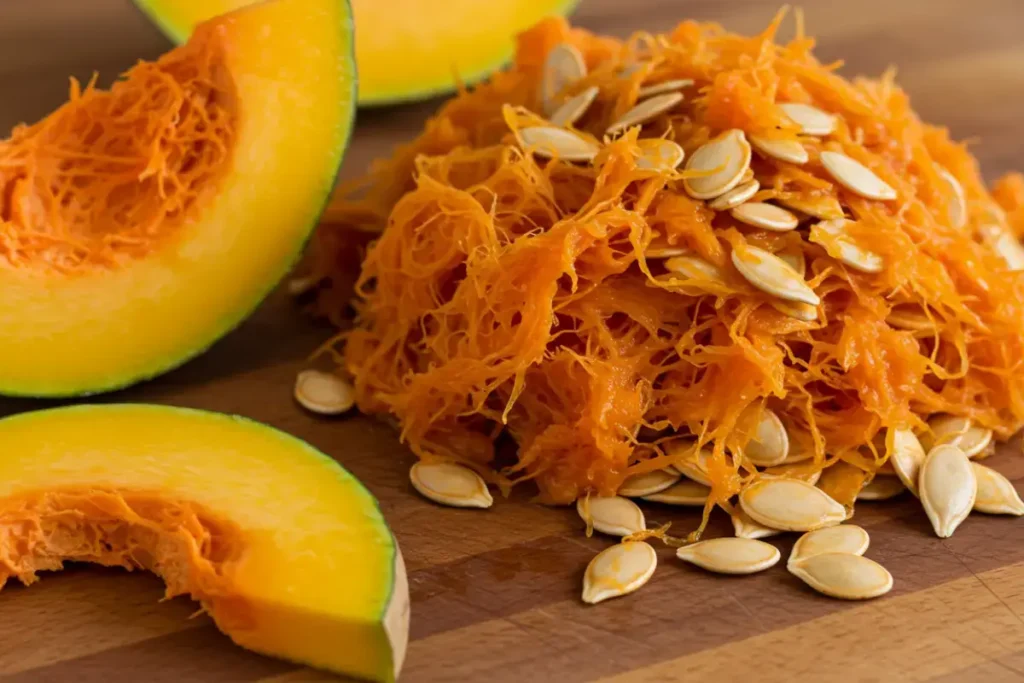
Scooping Out the Seeds
Use a spoon to scoop out the seeds and surrounding pulp. Transfer the seeds to a bowl, separating them from the fibrous material. This step ensures that only clean seeds make it to the roasting stag.
Cleaning the Seeds
- Rinse the Seeds: Place the seeds in a colander and rinse them under cold running water to remove any remaining pulp.
- Agitate Gently: Use your hands to agitate the seeds, ensuring all residue is washed away.
- Dry the Seeds: Spread the cleaned seeds on a clean towel or paper towel and pat them dry thoroughly.
Tips for Efficient Cleaning
- Use Cold Water: Cold water helps in easily separating the seeds from the pulp.
- Agitate Well: Proper agitation ensures no pulp remains, preventing any bitterness in the roasted seeds.
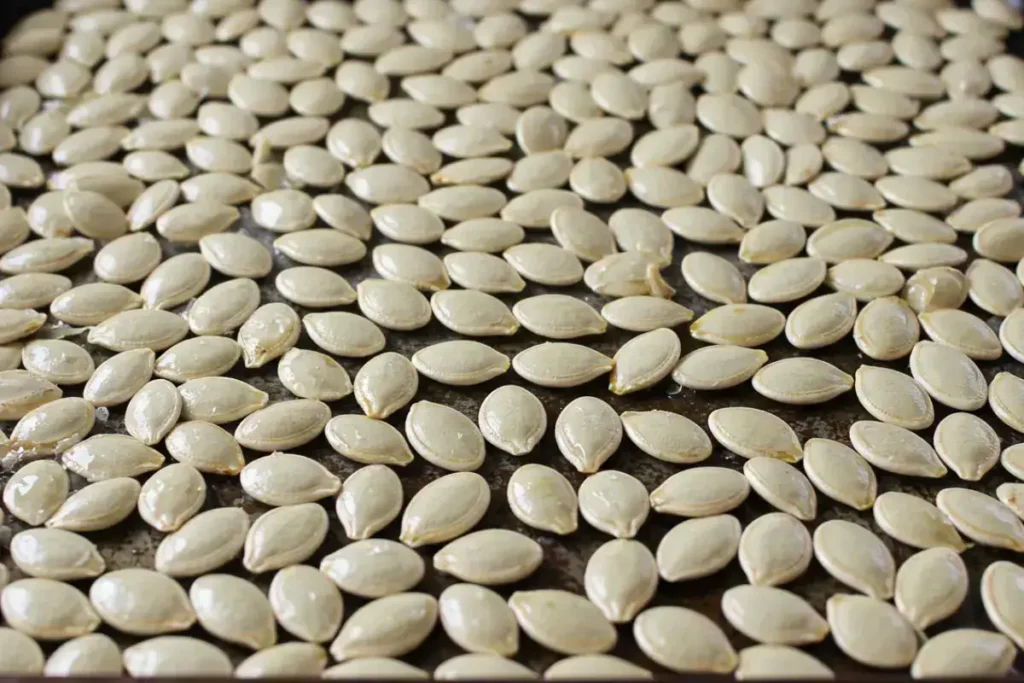
Drying the Seeds
Drying the seeds is crucial for achieving that perfect crispy texture. Moisture can lead to soggy seeds and uneven roasting.
Methods for Drying
- Air Drying: Spread the seeds on a drying rack and let them air dry for a few hours.
- Towel Drying: Pat the seeds dry with a clean towel to remove excess moisture.
- Using a Dehydrator: If available, use a dehydrator on a low setting to speed up the drying process.
Essential Equipment for Roasting Seeds
List of Necessary Tools
- Baking Sheets: Preferably rimmed to prevent seeds from falling off.
- Parchment Paper or Silicone Mats: For easy cleanup and to prevent sticking.
- Mixing Bowls: For tossing the seeds with oil and seasonings.
Tips for Selecting and Using Equipment
- Choose the Right Size: Ensure your baking sheets are large enough to spread the seeds in a single layer for even roasting.
- Use Non-Stick Surfaces: Parchment paper or silicone mats help in achieving perfectly roasted Kabocha Squash seeds without any sticking.
Roasting Tips, Tricks, and Notes
Perfect Roasting Time and Temperature
Maintaining the right temperature and roasting time is crucial. Too high a temperature can burn the seeds, while too low can leave them undercooked and soggy. Stick to the recommended 300°F (150°C) for best results.
Ensuring Even Roasting
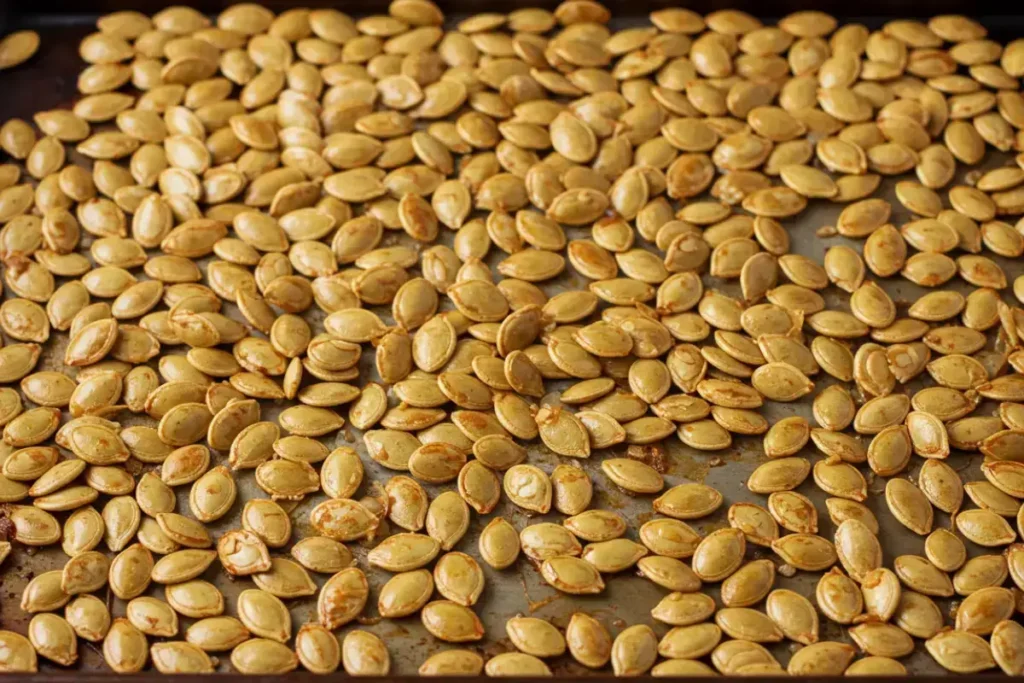
Stir the seeds halfway through the roasting process to promote even cooking and prevent any from burning.
How to Prevent Over-Roasting or Under-Roasting
- Monitor Closely: Keep an eye on the seeds during the last 10 minutes of roasting to prevent burning.
- Stir Frequently: Stirring ensures even heat distribution, reducing the risk of over-roasting any single area.
Enhancing Flavor Without Compromising Texture
Use a light hand with seasonings. Too much salt or sugar can overpower the natural flavor of the roasted Kabocha Squash seeds and affect their texture. Start with small amounts and adjust to taste.
Variations of Roasted Kabocha Squash Seeds
Sweet vs. Savory Roasting Variations
- Sweet Roasting: Ideal for dessert toppings or a sweet snack. Use cinnamon, sugar, and a touch of vanilla extract.
- Savory Roasting: Perfect for salads or as a crunchy topping. Opt for garlic powder, smoked paprika, and a pinch of cayenne pepper.
Spicy and Tangy Options
Add chili powder and a squeeze of lime juice before roasting to create a spicy and tangy snack that’s bursting with flavor.
Glazed or Candied Seeds
For a decadent treat, toss the seeds in a maple syrup glaze before roasting. This results in a sweet, crunchy coating that’s irresistible.
How to Serve Roasted Kabocha Squash Seeds
As a Standalone Snack
Enjoy roasted kabocha squash seeds straight from the bowl. They make a perfect on-the-go snack that’s both delicious and nutritious.
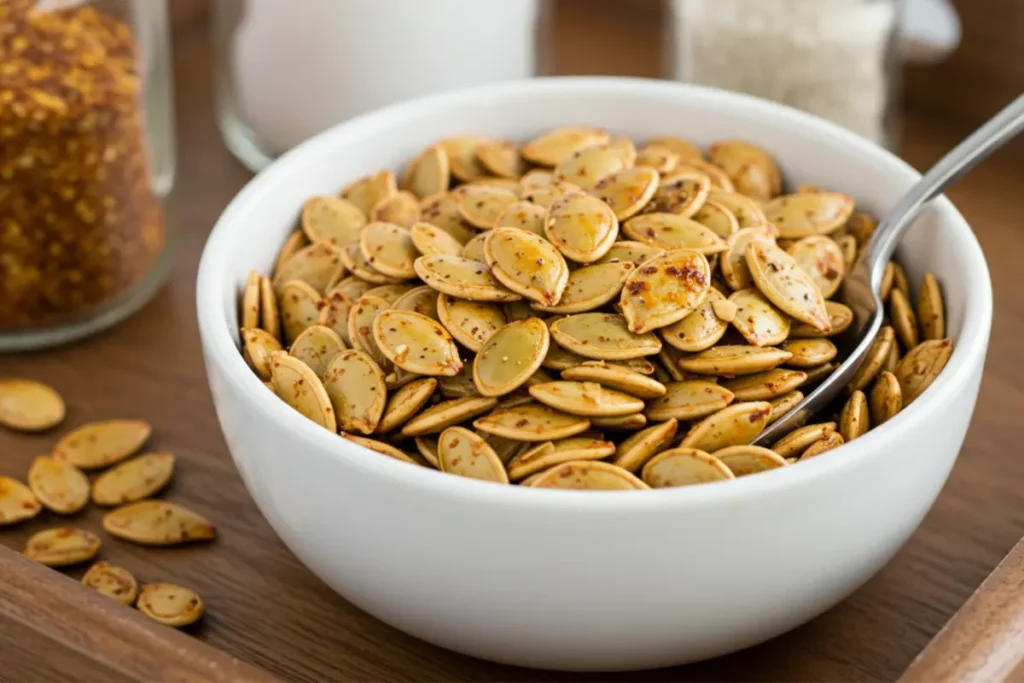
Salad Toppings
Sprinkle the roasted kabocha squash seeds over fresh greens to add a delightful crunch and a burst of flavor to your salads.
In Granola and Trail Mix
Incorporate roasted seeds into homemade granola or trail mix for an added protein boost and texture.
Baked Goods and Other Dishes
Use roasted kabocha squash seeds as a topping for bread, muffins, or even desserts to enhance both flavor and presentation.
What Other Winter Squash Seeds Can Be Roasted?
Besides kabocha, several other winter squash seeds are excellent for roasting:
- Pumpkin Seeds: The most commonly roasted seeds, known for their versatility.
- Butternut Squash Seeds: Sweet and nutty, similar to kabocha.
- Acorn Squash Seeds: Milder in flavor, offering a subtle crunch.
Comparison of Flavor and Texture
- Pumpkin Seeds: Earthy and slightly nutty with a firm crunch.
- Butternut Squash Seeds: Sweet and rich, similar to kabocha.
- Acorn Squash Seeds: Mild and delicate, less intense than kabocha.
Additional Squash Seed Recipes
Related Recipes Using Roasted Squash Seeds
- Seed-Crusted Proteins: Use roasted seeds to coat chicken or fish for an added crunch.
- Vegetable Toppings: Sprinkle seeds over roasted vegetables for extra texture and flavor.
Creative Culinary Uses
- Desserts: Incorporate sweet roasted seeds into desserts like ice cream or chocolate bark.
- Snacks: Mix seeds with dried fruits and nuts for a homemade trail mix.
- Main Dishes: Add seeds to grain bowls or use them as a garnish for soups and stews.
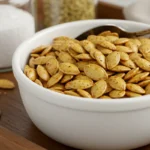
Roasted Kabocha Squash Seeds
- Total Time: 45 minutes
- Yield: 2 cups
- Diet: Vegan
Description
easy step-by-step of how to make delicious and nutritious roasted kabocha squash seeds. Perfect for a healthy snack or flavorful topping!
Ingredients
What You Need for Roasting Kabocha Seeds?
- Kabocha Squash Seeds: 1 cup, cleaned and dried
- Olive Oil: 1-2 tablespoons
- Salt: 1/2 teaspoon (sea salt or kosher salt preferred)
Optional Seasonings and Flavorings:
- Garlic Powder: 1/2 teaspoon
- Paprika: 1/2 teaspoon
- Cayenne Pepper: 1/4 teaspoon (for a spicy kick)
- Cinnamon: 1/2 teaspoon (for a sweet variation)
- Sugar: 1 tablespoon (for a sweet variation)
- Maple Syrup: 1 tablespoon (for a sweet glaze)
- Smoked Paprika: 1/2 teaspoon (for a smoky flavor)
- Cumin: 1/2 teaspoon
- Chili Powder: 1/2 teaspoon
- Rosemary: 1 teaspoon, finely chopped
- Thyme: 1 teaspoon, finely chopped
Instructions
1. Halve the Squash: Use a sharp knife to carefully cut the kabocha squash in half. Lay the halves flat on a stable cutting board to ensure safety while cutting.
2.Scoop Out and Clean the Seeds: Use a spoon to scoop out the seeds and surrounding pulp from each squash half. Transfer the seeds to a colander and rinse them thoroughly under cold running water to remove any remaining pulp.
3. Dry the Seeds: Spread the cleaned seeds on a clean towel or paper towel and pat them dry to remove excess moisture. Ensure the seeds are completely dry to achieve a crispy texture during roasting.
4. Season the Seeds: In a large mixing bowl, toss the dried seeds with olive oil, ensuring each seed is lightly coated. Add salt and your choice of optional seasonings (e.g., garlic powder, paprika, cayenne pepper) and mix well to distribute the flavors evenly.
5. Preheat the Oven: Preheat your oven to 300°F (150°C). Preparing the oven in advance ensures that the seeds roast evenly and achieve the desired crispiness.
6. Arrange Seeds on Baking Sheets: Line two baking sheets with parchment paper or silicone mats. Spread the seasoned seeds in a single layer on the prepared baking sheets, making sure they are not overcrowded to allow for even roasting.
7. Roast the Seeds: Place the baking sheets in the preheated oven and roast the seeds for 25-30 minutes. Stir the seeds halfway through the roasting time to ensure they cook evenly and prevent burning.
8. Cool the Seeds: Once roasted, remove the baking sheets from the oven and allow the seeds to cool completely on the sheets. Cooling helps them become crispy and crunchy.
9. Store the Roasted Seeds: Transfer the cooled seeds to an airtight container. They can be stored at room temperature for up to two weeks or refrigerated for longer freshness.
10. Enjoy!: Snack on your roasted kabocha squash seeds as a healthy treat, sprinkle them over salads, mix them into granola, or use them as a crunchy topping for your favorite dishes.
Notes
- Ensure Seeds are Thoroughly Dry: Moisture can prevent seeds from becoming crispy. Pat them dry well before seasoning.
- Even Coating: Toss seeds thoroughly with oil and seasonings to ensure each seed is flavorful.
- Single Layer Roasting: Spread seeds in a single layer on baking sheets to promote even roasting and prevent burning.
- Stir Midway: Stirring seeds halfway through roasting ensures uniform cooking and prevents any from becoming too dark.
- Customize Your Flavors: Experiment with different seasoning blends to create your favorite flavor profiles, whether sweet, savory, or spicy.
- Prep Time: 15 minutes
- Cook Time: 30 minutes
- Category: Snack/Appetizer
- Method: roasting
- Cuisine: American/Japanese-inspired
Nutrition
- Serving Size: 28g
- Calories: 150 kcl
- Sugar: 1g
- Sodium: 150mg
- Fat: 13g
- Saturated Fat: 2g
- Unsaturated Fat: 11g
- Trans Fat: 0
- Carbohydrates: 4g
- Fiber: 2g
- Protein: 7g
- Cholesterol: 0mg
Keywords: kabocha squash seeds, Roasted Kabocha Squash Seeds
Frequently Asked Questions
How Do I Store Roasted Kabocha Squash Seeds?
Store roasted squash seeds in an airtight container at room temperature. They can stay fresh for up to two weeks. For longer storage, keep them in the refrigerator for up to a month.
Can I Roast Seeds from Any Kind of Winter Squash?
Yes, you can roast seeds from various winter squashes like pumpkin, butternut, and acorn. Each type offers a unique flavor and texture, so feel free to experiment with different varieties.
How Do Roasted Kabocha squash Seeds Compare to Pumpkin Seeds?
Roasted kabocha seeds have a slightly sweeter and nuttier flavor compared to pumpkin seeds. They also offer a firmer crunch, making them a delightful alternative for those seeking a more robust flavor profile.
What Are the Best Seasonings for Roasted Kabocha squash Seeds?
Popular seasonings include salt, garlic powder, paprika, cinnamon, and sugar. For a more adventurous twist, try curry blends, taco seasoning, or herbed mixes like rosemary and thyme.
How Long Do Roasted Seeds Stay Fresh?
When stored properly in an airtight container, roasted seeds remain fresh for up to two weeks at room temperature and up to a month in the refrigerator.
Can I Microwave Roast the Seeds?
While it’s possible to microwave roast seeds, it’s not the most effective method for achieving an even roast and crispy texture. Oven roasting is recommended for the best results.
Are There Any Health Considerations?
If you have allergies to seeds or nuts, consult with a healthcare professional before incorporating roasted squash seeds into your diet. Additionally, consume in moderation as they are calorie-dense.
Conclusion
Roasted kabocha squash seeds are a versatile, nutritious, and delicious addition to your snack repertoire. Whether you’re seeking a healthy alternative to traditional snacks or looking to enhance your meals with a crunchy topping, these seeds have got you covered. With their impressive nutritional profile and myriad of flavor possibilities, roasted kabocha squash seeds are sure to become a staple in your kitchen.
Disclaimer: This information is for informational purposes only and does not replace professional medical advice. Always consult with a healthcare professional regarding dietary changes or health concerns.

